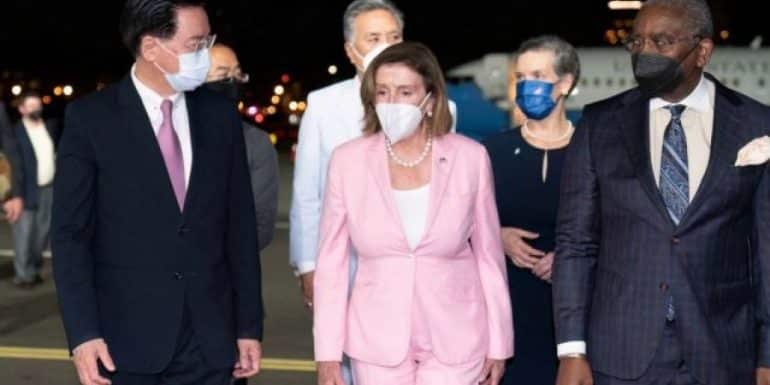China's Vice Foreign Minister Xie Feng urgently called US Ambassador Nicholas Burns late Tuesday night, demanding an explanation for US House Speaker Nancy Pelosi's visit to Taiwan, which has drawn Beijing's strong reaction.
Underscoring that Pelosi is deliberately provoking and "playing with fire", Xie Feng said the visit is a serious violation of the "one China principle", undermines peace and stability in the wider region and sends the wrong message to separatist forces about "Taiwan independence".
“The move is extremely blatant and the consequences will be extremely serious. China is not going to stand idly by," said the Chinese Deputy Foreign Minister.
Arguing that the American government must be held accountable, he pointed to a series of actions that indicate, according to him, a change in Washington's attitude.
In particular, on the website of the US Department of State Taiwan is not mentioned as a "part of China", it has joined the so-called "Indo-Pacific strategy, Washington's ties with Taipei have been upgraded, arms sales have increased (…) and support in separatist activities for "Taiwan independence".
He warned that the US side would "pay the price" for its mistakes and urged the US to take practical steps to undo the negative impact of Pelosi's visit to Taiwan.
The United States should not go further down the wrong path, escalating the tension in Sino-US relations, according to Xie Feng, who called on Washington not to interfere in China's internal affairs.
At the same time, China has announced the start of military exercises around Taiwan and has imposed a series of embargoes on its products. The US has mobilized its aircraft carriers sailing in the region, setting the stage for war.
Taiwan belongs to China and will gradually "return to the arms of the motherland", he stressed. "No country, no power, no one should underestimate the determination, strong will and great ability of the Chinese government and people to defend sovereignty and territorial integrity and achieve national reunification," he added.
The visit is added to a series of confrontations of the past, the chronicle
It is not the first time that Nancy Pelosi has provoked a strong reaction from Beijing.
Her visit to Taiwan yesterday, defying warnings from the Chinese government, added to a long list of past controversies as she has at times strongly criticized China's policies.
The trip of the 82-year-old speaker of the US House of Representatives, which was described as "extremely dangerous" by Beijing, caused a sensation worldwide and reactions even in the United States, where Pelosi has fierce critics, especially among conservatives.
The White House expressed confusion over the visit, which was never officially confirmed before the plane carrying Pelosi landed in Taipei.
However, spokesman John Kirby maintained that he does not think there is anything that "causes a crisis or a conflict". Not a few American officials have visited Taiwan in the past.
However, the speaker of the House of Representatives is the highest-ranking US official to visit the island since the 1997 trip of her predecessor, Newt Gingrich.
The United States practices so-called "strategic ambiguity" diplomacy in relation to Taiwan. They only recognize the Chinese government, but continue to provide decisive support to Taipei.
Washington, however, has avoided making clear whether it plans to defend Taiwan militarily in the event of an invasion. In an article published today in the Washington Post, Nancy Pelosi assures that her visit is aimed "to be on the side of Taiwan (…) where democracy is threatened".
Nancy Pelosi had angered Beijing in 1991 by visiting Tiananmen Square two years after the crackdown on pro-democracy protests.
Accompanied by two MPs, she went to the square without authorization and raised a black and white banner in tribute to the protesters who were killed.
"To those who died for democracy in China," read the banner, which angered Chinese authorities. A police escort was removed from Tiananmen Square.
Nancy Pelosi also maintains friendly ties with the Dalai Lama, whom she visited in Dharamsala in 2008 and met the Archbishop of Shanghai.
"If those who love freedom do not denounce the repression in China and Tibet, then we will lose any moral right to defend human rights anywhere in the world," he said at the time.
He also called pro-democracy protesters in Hong Kong "heroes" and strongly denounced the persecution of Uyghurs in China. As Speaker of the House of Representatives, Nancy Pelosi is second in line to the (emergency) line of succession for President of the United States, after Vice President Kamala Harris.
Born on March 26, 1940 in Baltimore, she has been married since 1963 to businessman Paul Francis Pelosi with whom she has five children. He quickly rose to prominence within the Democratic Party and was elected to Parliament for the first time at the age of 47.
In the Republican camp he has many dislikes. After all, one does not easily forget her gesture in 2020, when she tore up the copy of the State of the Nation address that then-President Donald Trump had just delivered.
Source: RES-EAP
